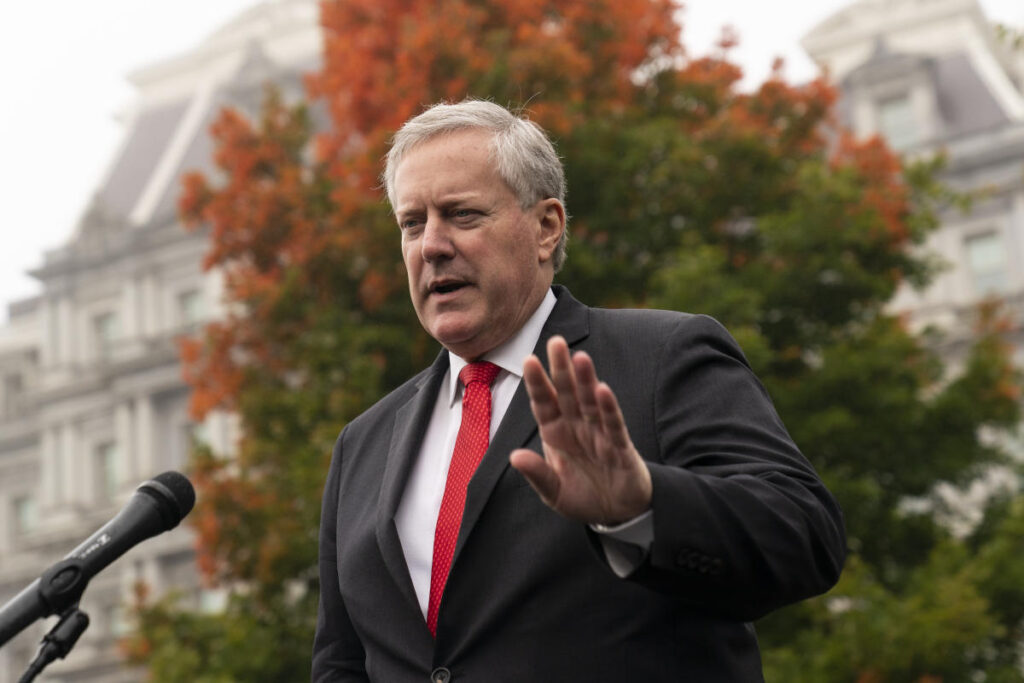A federal judge has dismissed former Trump White House Chief of Staff Mark Meadows’ attempt to obtain extensive records from the National Archives, which he believed were crucial for defending himself against criminal charges in Georgia. U.S. District Judge Tim Kelly ruled that Meadows’ approach was fundamentally flawed. Although a Georgia state judge had allowed him to seek these records, Judge Kelly pointed out that state courts typically lack jurisdiction when it comes to actions involving federal agencies. He emphasized that the court must adhere to jurisdictional boundaries, effectively putting an end to Meadows’ quest for documents that might aid in his legal struggles related to allegations of election interference.
Meadows had sought various forms of communication, specifically emails and text messages, as well as other documents from the Archives to reinforce his defense against the criminal charges he faces in Georgia. These charges stem from his involvement in efforts to challenge the 2020 election results, particularly in relation to former President Donald Trump’s actions. Since Trump left office, Meadows has largely kept a low profile but faced mounting legal pressures, including being compelled to provide testimony to both the House Jan. 6 select committee and the team of special counsel Jack Smith in 2022. His attempts to access federal records mark a notable move in his efforts to navigate the legal ramifications of his actions during the heightened tensions surrounding the 2020 election.
Initially, Meadows became quite prominent during the events surrounding the election. His strategic role included coordinating communications among the Trump campaign, state election officials, and the Republican National Committee (RNC) to rally support for Trump’s baseless claims of voter fraud. This culminated in criminal charges brought against him by Fulton County District Attorney Fani Willis, who accused him of participating in efforts to reverse the outcome of the election in Georgia. Meadows was notably involved in a controversial phone call between Trump and Georgia’s Secretary of State Brad Raffensperger, during which Trump urged election officials to “find” enough votes to alter his defeat.
Despite Meadows previously being a looming figure in discussions about the integrity of the 2020 election, he had been cautious in shedding light on his own actions following Trump’s presidency. His initial resistance to appearing before the House Jan. 6 select committee was particularly notable given his past involvement in the events leading up to and following the Capitol riot. Nevertheless, he eventually turned over significant text messages that provided vital insights into the committee’s investigations, showcasing a complex balance of cooperation and evasion in his post-White House life.
Following the legal setbacks, the focus has returned to how Meadows will construct his defense without the sought-after records, particularly given the substantial timeline of events leading up to the January 6 insurrection. His legal strategy will now need to adapt without the additional contextual support he hoped to gain from the National Archives. The ruling underscored significant challenges for Meadows as he maneuvers through a legal landscape that continues to evolve as new information and revelations come to light regarding the Trump administration’s activities during and after the 2020 election.
In summary, Judge Kelly’s ruling signifies a critical moment in Meadows’ ongoing legal battles, as it not only highlights jurisdictional limitations but also underscores the broader implications of Trump’s attempts to overturn electoral results. Meadows’ involvement in high-profile communications and efforts to contest the election integrity has resulted in serious legal consequences, raising questions about accountability for individuals within the former administration. The outcome of this case, as well as Meadows’ ability to navigate the unfolding legal challenges, remains a focal point in understanding the lasting implications of the 2020 presidential election dispute and the actions of those in power during that contentious period.

